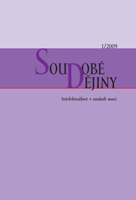The Dominance of the State: Austrian Contemporary History Caught between Politics and Scholarship
Dominance statu. Rakouské soudobé dějiny na skřipci mezi politikou a vědou
Author(s): Ernst HanischSubject(s): History
Published by: AV ČR - Akademie věd České republiky - Ústav pro soudobé dějiny
Summary/Abstract: Translated from Germany by Petr Dvořáček. This is a Czech translation of ‘Die Dominanz des Staates: Osterreichische Zeitgeschichte im Drehkreuz von Politik und Wissenschaft’ published in Alexander Nutzenadel and Wolfgang Schieder (eds), Zeitgeschichte als Problem: Nationale Traditionen und Perspektiven der Forschung (Gottingen: Vandenhoeck & Ruprecht 2004, pp. 54–77). The author argues that contemporary history in Austria became established at the beginning of the 1960s, that is, ten years later than in the Federal Republic of Germany. It was not established from a need to come to terms with the Nazi past, but to rethink the teaching of history, which neglected the conflict-fraught history of the first (pre-war) republic and the existence of the post-war (second) republic. Consensus was found in ‘coalition historiography’ (Koalitionsgeschichtsschreibung), which corresponded to the constellation of power in the state, long determined by the operation of the grand coalition of the Austrian People’s Party (Osterreichische Volkspartei – OVP) and the Austrian Social Democratic Party (Sozialdemokratische Partei Osterreichs – SPO). From the 1960s into the 1980s contemporary history was extensively institutionalized as a field, and was fully freed from the current events in Austria. Historiography remained markedly linked to the State, however, by various commissions on which historians sat together with politicians, research teams attached to ministries, and state-financed research projects on politically relevant topics. The author sees the causes in the Austrian tradition and the political circumstances of post-war Austria. He does not, however, on the whole judge the links between the State and scholars of contemporary history to be something bad, because they have not resulted in a State historiography or a system that suppresses freedom of opinion. In some cases, moreover, State initiatives have contributed to fertile discussion, of which there is a general shortage in Austrian contemporary historiography. In the 1970s, coalition historiography, promoted by the generation of historians born in the 1920s, with its preference for political history and the positivist approach, was challenged by the generation of Sixty-eighters, which opened the field of contemporary history to diverse impulses from the social sciences, and oriented the field to research on Nazism. Only at this point did historians begin to see Nazism as part of Austrian history and cease to perceive Austria as the Nazis’ first victim.
Journal: Soudobé Dějiny
- Issue Year: XVI/2009
- Issue No: 01
- Page Range: 131-154
- Page Count: 24
- Language: Czech

